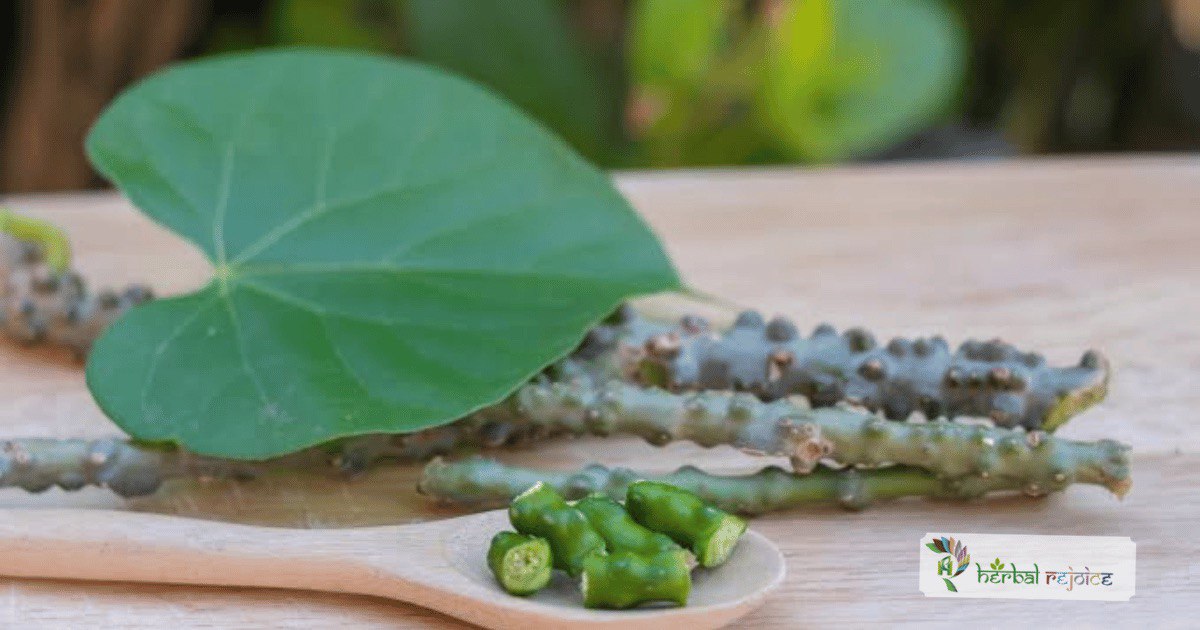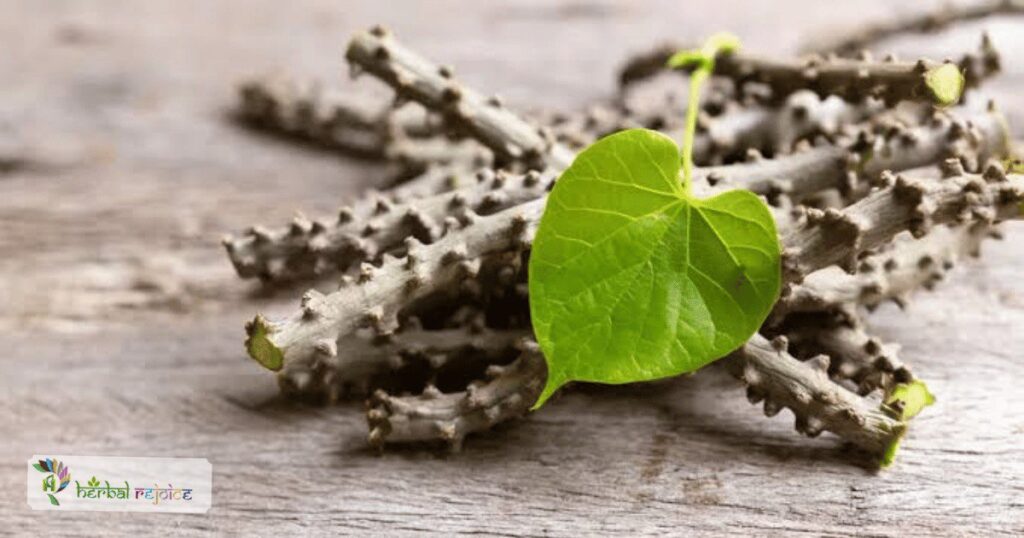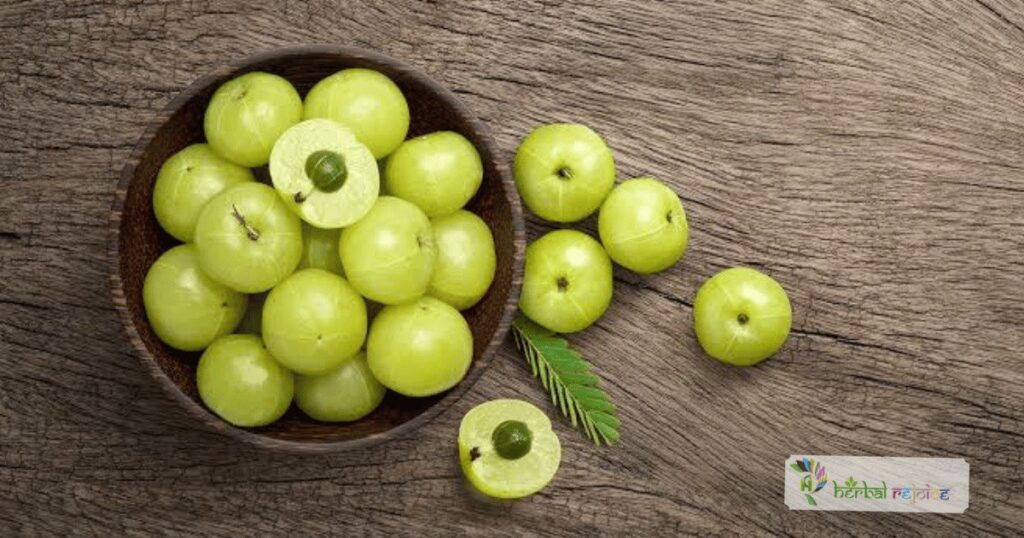Introduction
Guduchi (Tinospora cordifolia Willd.) Miers ex Hook. f. & Thoms, also known as Guduuchi or Giloy, is a herb native to tropical India and the Andaman Islands. It belongs to the Menispermaceae family. Guduchi is used to treat high fever, jaundice, intestinal worms, rheumatic conditions, spasms, excessive urination, diarrhea and various skin conditions. The stem of Tinospora cordifolia has been used in various traditional medicinal systems such as Ayurveda, Unani, Siddha, and folk medicine for its numerous health benefits.
Traditional Uses of Guduchi
Tinospora cordifolia has been traditionally used for its antipyretic (fever-reducing), antiperiodic (treating periodic fevers), anti-inflammatory, antirheumatic (treating rheumatic conditions), spasmolytic (relieving spasms), hypoglycemic (lowering blood sugar levels), and hepatoprotective (protecting the liver) properties. The water extract of the herb has diuretic properties and increases urine output.
Potential Health Benefits of Guduchi
The stem juice of Tinospora cordifolia is commonly prescribed in high fever, while the decoction (a mixture made by boiling the herb in water) is used in the treatment of rheumatic and bilious fevers. The aqueous extract of the plant has been found to possess fabrifuge properties, helping to eliminate intestinal worms. The starch derived from Tinospora cordifolia has antacid, antidiarrheal, and antidysenteric properties.
Chemical Constituents of Guduchi
According to the Ayurvedic Pharmacopoeia of India, the dried stems of Tinospora cordifolia are recommended for the treatment of jaundice, anemia, polyuria (excessive urination), and various skin diseases.
The stem of the herb contains alkaloidal constituents such as berberine, bitter principles like columbin, chasmanthin, palmarin, tinosporon, tinosporic acid, and tinosporol.
Studies have shown that the herb has one-fifth of the analgesic effect of sodium salicylate. Its aqueous extract has a high phagocytic index, indicating its immune-boosting properties.
The alcoholic extract of the stem has shown activity against E. coli bacteria. Active principles found in Tinospora cordifolia have also been found to inhibit the growth of Mycobacterium tuberculosis, the bacteria responsible for tuberculosis.
Key Components and Their Benefits
Studies have demonstrated the beneficial effects of Tinospora cordifolia on blood sugar and lipid levels. Oral administration of alcoholic extract of the herb’s roots has led to a significant reduction in blood and urine glucose and lipids in serum and tissues of diabetic rats.
Additionally, during CCl4 intoxication (toxicity induced by carbon tetrachloride) in mature rats, Tinospora cordifolia treatment resulted in a significant reduction in liver enzyme levels and bilirubin, indicating its hepatoprotective properties.
The plant extract has also shown inactivating activity against Hepatitis B surface antigen in vitro.

More About Guduchi
Researchers have also isolated a new hypoglycemic agent from Tinospora cordifolia, which was found to be a 1,2-substituted pyrrolidine.
The starch derived from the roots and stem of the herb, which is commonly used in the treatment of chronic diarrhea and dysentery, contains a polysaccharide with a 1-4 glucan structure and occasional branching points.
Dosage
The recommended dosage of Tinospora cordifolia stem is 3-6 grams in powder form or 20-30 grams for making a decoction.
Conclusion
In conclusion, Tinospora cordifolia (Guduuchi/Giloy) is a potent herb with a wide range of therapeutic properties. It has been traditionally used for its antipyretic, anti-inflammatory, and hepatoprotective properties, among others.
Modern research has supported its traditional uses and uncovered further health benefits. Incorporating Tinospora cordifolia into one’s wellness routine may be beneficial.
Frequently Asked Questions(FAQs)
What is Tinospora cordifolia?
Tinospora cordifolia, also known as Guduuchi or Giloy, is a herb native to tropical India and the Andaman Islands.
What family does Tinospora cordifolia belong to?
Tinospora cordifolia belongs to the Menispermaceae family.
What are the traditional medicinal uses of Tinospora cordifolia?
Tinospora cordifolia has been traditionally used for its antipyretic, antiperiodic, anti-inflammatory, antirheumatic, spasmolytic, hypoglycemic, and hepatoprotective properties.
What are some of the health benefits of Tinospora cordifolia?
Tinospora cordifolia has been found to have fever-reducing, immune-boosting, liver-protecting, and anti-diabetic effects, among others.
How is Tinospora cordifolia used in traditional medicine?
The stem juice and decoction of Tinospora cordifolia are commonly used in traditional medicine for treating various conditions such as high fever, rheumatic fevers, and jaundice.
Does Tinospora cordifolia have diuretic properties?
Yes, the water extract of Tinospora cordifolia has diuretic properties and can increase urine output.
Can Tinospora cordifolia help eliminate intestinal worms?
Yes, the aqueous extract of Tinospora cordifolia has been found to possess fabrifuge properties, helping to eliminate intestinal worms.
What active constituents are found in Tinospora cordifolia?
Tinospora cordifolia contains alkaloidal constituents such as berberine, bitter principles like columbin, chasmanthin, palmarin, tinosporon, tinosporic acid, and tinosporol.
Is Tinospora cordifolia effective against bacterial infections?
Yes, studies have shown that the alcoholic extract of Tinospora cordifolia has activity against E. coli bacteria.
Can Tinospora cordifolia inhibit the growth of Mycobacterium tuberculosis?
Yes, active principles found in Tinospora cordifolia have been found to inhibit the growth of Mycobacterium tuberculosis, the bacteria responsible for tuberculosis.
What effects does Tinospora cordifolia have on blood sugar and lipid levels?
Studies have shown that Tinospora cordifolia can reduce blood and urine glucose and lipids in serum and tissues of diabetic rats.
Does Tinospora cordifolia have hepatoprotective properties?
Yes, Tinospora cordifolia has been found to have hepatoprotective properties, as it can reduce liver enzyme levels and bilirubin.
Can Tinospora cordifolia inactivate Hepatitis B surface antigen?
Yes, Tinospora cordifolia extract has shown inactivating activity against Hepatitis B surface antigen in vitro.
Are there any specific compounds isolated from Tinospora cordifolia?
Researchers have isolated a new hypoglycemic agent and a polysaccharide from Tinospora cordifolia.
What is the recommended dosage of Tinospora cordifolia?
The recommended dosage of Tinospora cordifolia stem is 3-6 grams in powder form or 20-30 grams for making a decoction.
Is it safe to use Tinospora cordifolia?
While Tinospora cordifolia is generally considered safe, it is always advisable to consult a healthcare professional before starting any herbal treatment.
Can Tinospora cordifolia be used as a preventive health supplement?
Incorporating Tinospora cordifolia into one’s wellness routine may be beneficial.
Can Tinospora cordifolia be used as a natural remedy for fever?
Yes, Tinospora cordifolia has traditionally been used as a remedy for fever.
Does Tinospora cordifolia have any anti-inflammatory properties?
Yes, Tinospora cordifolia has been traditionally used for its anti-inflammatory properties.
Are there any scientific studies supporting the traditional uses of Tinospora cordifolia?
Yes, modern research has supported the traditional uses of Tinospora cordifolia and has found further health benefits.


